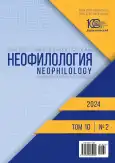Features of the part-speech composition of terms of international air law in English and Russian languages
- Authors: Medvedeva E.P.1
-
Affiliations:
- National Research University Higher School of Economics
- Issue: Vol 10, No 2 (2024)
- Pages: 354-365
- Section: LANGUAGES OF PEOPLES OF FOREIGN COUNTRIES (GERMANIC LANGUAGES)
- URL: https://journal-vniispk.ru/2587-6953/article/view/295598
- DOI: https://doi.org/10.20310/2587-6953-2024-10-2-354-365
- ID: 295598
Cite item
Full Text
Abstract
The work reveals a problem of the part-of-speech composition in terms of the English and Russian languages in international air law. The study presents an analysis of the parts of speech included in the term structure in international air law according to the criterion of certain terminological field. The purpose of the study is to determine the most characteristic part-of-speech composition for the terms of several groups, identified on the basis of a common field in terminological systems Russian and English. This principle of analysis helps to compare terminological groups in different language systems. The objectives of the study were to identify the frequency of a certain part-ofspeech structure for the terms of the Russian and English languages. The work presents an empirical study, which prove that the proposed version of the analysis makes it possible to compare each lexical and semantic group in the English language with the Russian language in terms of the frequency of a certain part-of-speech structure; to identify the main dynamics in certain part-ofspeech structures in the English and Russian terminological systems of international air law. Based on the results of the study, the following conclusions were made: comparative analysis of the partof-speech structure based on the criterion of a single semantic core within the branch of international air law is the most objective criterion that allows the comparison of terms from two different language systems within the framework of cross-linguistic research; part-of-speech structures of terms are directly related to the structural features of the Russian and English languages.
About the authors
E. P. Medvedeva
National Research University Higher School of Economics
Author for correspondence.
Email: MedKetrin94@gmail.com
ORCID iD: 0000-0002-0485-8907
Tutor, School of Foreign Languages
20 Myasnitskaya St., Moscow, 101000, Russian FederationReferences
- Vorob’ev V.V., Zakirova E.S., Davtyan A.G., Karpova T.A., Tsilenko L.P. Comparative analysis of international humanitarian law monocomponent terms in Russian and English languages. Gumanitarnye nauki i obrazovanie = The Humanities and Education, 2019, vol. 10, no. 2 (38), pp. 144-149. (In Russ.) https://elibrary.ru/ycjzqr
- Reformatskii A.A. Chto takoe termin i terminologiya [What is a term and terminology]. Materialy Vse-soyuznogo terminologicheskogo soveshchaniya «Voprosy terminologii» [Proceedings of the All-Union Terminology Meeting “Terminology Issues”]. Moscow, 1961, pp. 46-62. (In Russ.)
- Grinev-Grinevich S.V. Terminovedenie [Terminology]. Moscow, “Akademiya” Publishing Centr, 2008, 304 pp. (In Russ.) https://elibrary.ru/vrduhv
- Shelov S.D. Ocherk teorii terminologii: sostav, ponyatiinaya organizatsiya, prakticheskie prilozheniya [Essay on the Theory of Terminology: Composition, Conceptual Organization, Practical Applications]. Moscow, “PrintPro” Publ., 2018, 472 p. (In Russ.)
- Leichik V.M. Terminovedenie. Predmet, metody, struktury [Terminology. Subject, Methods, Structures]. Mos-cow, “Librokom” Book House, 2009, 256 p. (In Russ.)
- Myakshin K.A. Parts of speech within the terminological system of English phonetics: the diachronic aspect. Vestnik Irkutskogo gosudarstvennogo lingvisticheskogo universiteta = Vestnik of Irkutsk State Linguistic University, 2019, no. 2, pp. 53-58. (In Russ.) https://elibrary.ru/nqrvvb
- Zakirova E.S. Sovremennye podkhody k leksikograficheskomu opisaniyu terminov [Modern approaches to the lexicographic description of terms]. Sbornik nauchnykh trudov «Slovo i slovar’» [Proceedings of Scientific Pa-pers “Word and Dictionary”]. Grodno, Yanka Kupala State University of Grodno Publ., 2013, pp. 148-150. (In Russ.)
- Zakirova E.S., Shvetsova E.V. Polyparadigm approach to the study of terms. Izvestiya MGTU «MAMI» = Izves-tiya of Moscow State Technical University “MAMI”, 2012, vol. 3. no. 2 (14), pp. 399-405. (In Russ.) https://elibrary.ru/mrbwqh
- Davtyan A.G. Sopostavitel’nyi analiz mnogokomponentnykh terminov v sostave analiziruemykh russkoi i an-gliiskoi terminologii mezhdunarodnogo gumanitarnogo prava [Comparative analysis of multicomponent terms within the analyzed Russian and English terminology of international humanitarian law]. Sbornik materialov mezhvuzovskoi studencheskoi nauchno-prakticheskoi konferentsii «Aktual’nye problemy mezhkul’turnoi kommunikatsii» [Proceedings of Materials of the Interuniversity Student Scientific and Practical Conference “Current Problems of Intercultural Communication”]. Moscow, Peoples’ Friendship University of Russia Publ., 2019, pp. 21-23. (In Russ.)
- Davtyan A.G. The method for forming of single-component and multi-component terms of international humanitarian law in Russian and English languages. Voprosy prikladnoi lingvistiki = Issues of Applied Linguistics, 2019, no. 1, pp. 55-67. (In Russ.) https://doi.org/10.25076/vpl.33.03, https://elibrary.ru/xsgugr
- Chilingaryan K.P. Corpus linguistics: theory vs methodology. Vestnik Rossiiskogo universiteta druzhby narodov. Seriya: Teoriya yazyka. Semiotika. Semantika = RUDN Journal of Language Studies, Semiotics and Semantics, 2021, no. 1, pp. 196-218. (In Russ.) https://doi.org/10.22363/2313-2299-2021-12-1-196-218, https://elibrary.ru/ymiame
- Frick F.S., Sumby W.H. Control tower language. Journal of the Acoustical Society of America, 1958, vol. 24, issue 6, pp. 595-596 p. https://doi.org/10.1121/1.1906939
- Sarmento S.A. Pragmatic account of aviation manuals. English for Specific Purposes World, 2005, vol. 4, no. 3, pp. 321-327.
- Strevens P. Special-purpose language learning: A perspective. Language Teaching, 1977, vol. 10, issue 3, pp. 145-163. https://doi.org/10.1017/S0261444800003402
- Wuster E. International Activity in Terminology: 75 years of Research Foundations and Challenge for the Rest of the Century. Munich, Infoterm Publ., 1976, ser. 3, pp. 32-40.
- Shcherbakova M.V. On determination of the part-of-speech affiliation of modal words. Litera, 2021, no. 11, pp. 162-179. (In Russ.) https://doi.org/10.25136/2409-8698.2021.11.36637, https://elibrary.ru/sqktdh
Supplementary files









